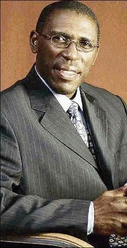Michael Jones - Balancing business strategy with human resource needs
Published: Wednesday | June 17, 2009

Michael Jones - Contributed
Michael Jones, senior vice-president, human resources, at the Bank of Nova Scotia (BNS), describes his role as that of the management of people-related issues and delivering people-related strategies to support the bank's business objectives.
With 25 years of experience in banking, he explains that his current role as head of human resources - HR - is a blend of "strategy and policy, as well as employee advocacy".
He adds, "HR is the conscience of the organisation. One has to consider the interest of the employees to ensure there is a place of overlap between their needs and that of the company. In designing a policy, this is the key imperative."
Education and qualification
Jones is a graduate of the University of Wales, where he completed the master's in business administration, the University of Michigan, where he did the advanced human resources programme, the University of Technology - UTech (formerly the College of Arts, Sciences and Technology - CAST) where he did banking, and the UK-based Institute of Chartered Secretaries and Administrators, where he completed the company secretarial practice and financial administration programme.
In Jamaica, he also attended Knox College.
Jones' appointment to the HR role at BNS was made after he completed his MBA and a dissertation on the human resource topic of absenteeism and its effect on the workplace. He reflects that his primary conclusion was that there are many motivators that people have to attend work and often absenteeism is driven by absence of these motivators - not by the widely perceived desire to stay home and do other things.
Lack of motivation
"I do not treat absenteeism as copping out. Instead, the things that prevent motivation must be confronted."
At BNS, employee polices are designed with this in mind. As an example, Jones points to policy related to the transfer of employees to meet business need.
"We sought to balance the immediate needs of those to be transferred with the needs of the bank. Such things as the impact on the immediate family is considered and transport and accommodation are provided where needed."
In the area of education, the bank provides what the HR manager describes as substantial support for individuals doing undergraduate programmes as long as this is job-, career- and bank-related.
In general, Jones believes that he has been able to balance his role as employee advocate with that of corporate strategist well. The position, he believes, is one that provides a broad-based knowledge of business, which can be useful in many other management roles.
"We have to interpret strategy and development interventions, deliver efficiency from a cost perspective; we also have to serve a large constituency with multiple needs across different age and career segments."
For those with an interest in HR as a career, Jones suggests that the core competencies needed are project management skills, numeracy skills, communication skills, negotiation skills, strategic influencing, change leadership skills, people management skills, as well as customer-focused skills.
Responding to the observation that human resources is considered one of the less glamorous roles in banking, the HR manager states, "dealing with people and issues related to people could never be boring. I always see the people. I don't see the transaction. Even when HR interventions are aimed at supporting the strategic direction of the business, there are people involved."
avia.collinder@gleanerjm.com



















